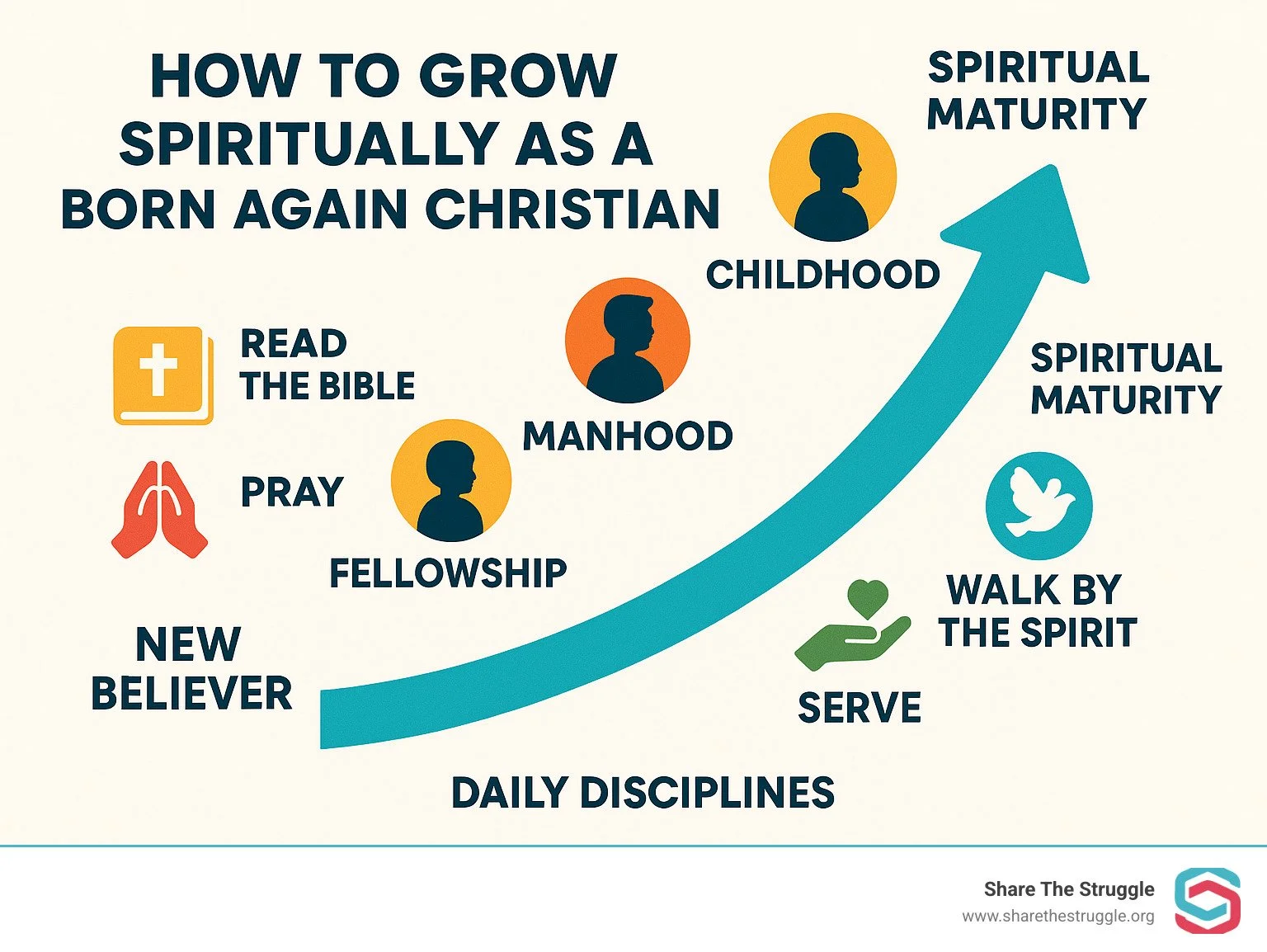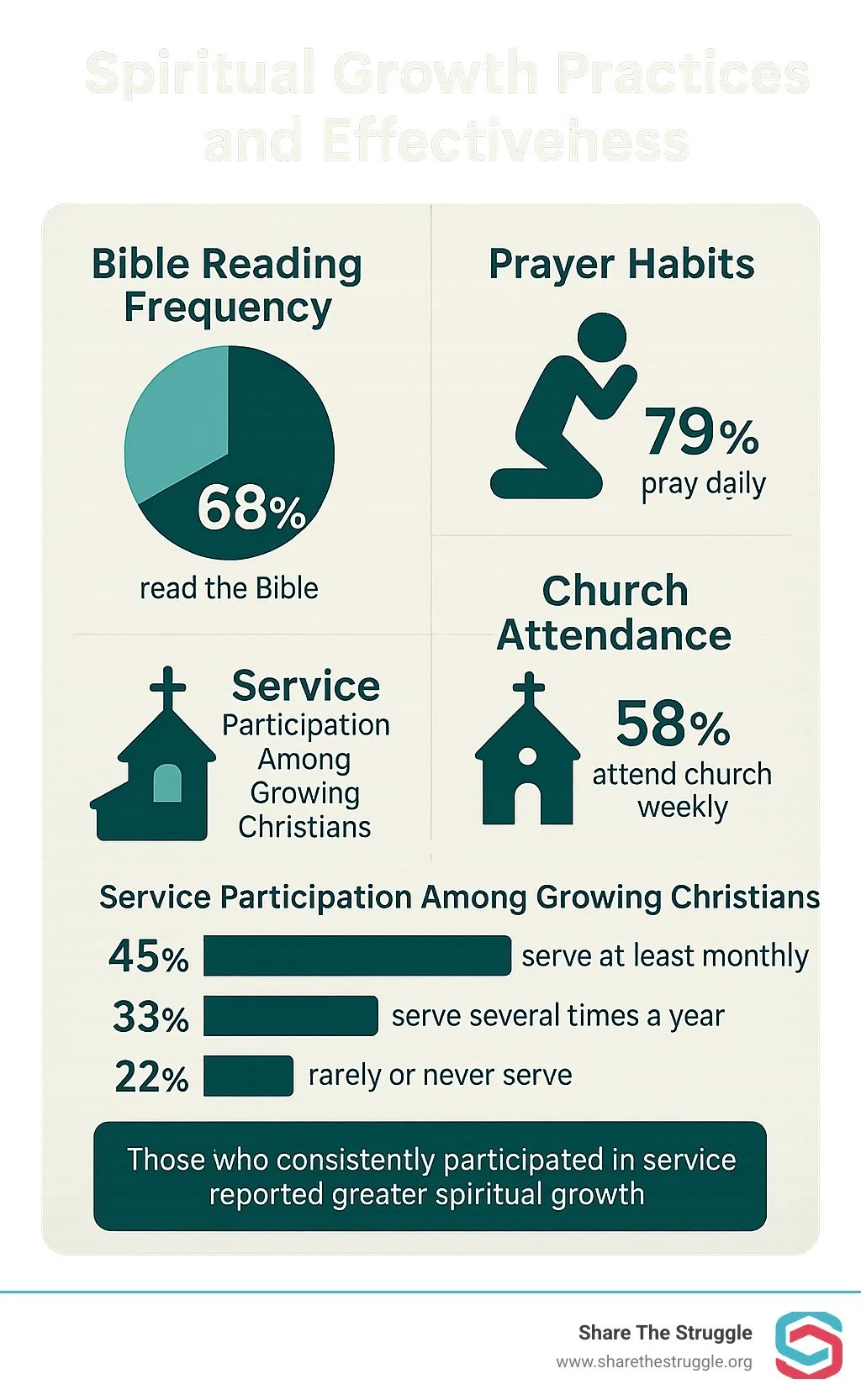Spiritual Growth for Born Again Christians: A Guide
Why Growing Spiritually as a Born Again Christian Matters
How to grow spiritually as a born again christian is one of the most important questions new believers ask. According to Barna Group research, 62% of practicing Christians read the Bible weekly, and those who do report significantly higher spiritual growth than those who don't.
Here's how to grow spiritually as a born-again Christian:
• Read God's Word daily - Start with 15 minutes of Bible reading each morning
• Pray without ceasing - Maintain ongoing conversation with God throughout your day
• Join a local church - Connect with other believers for accountability and encouragement
• Serve others - Use your gifts to help people in your community
• Share your faith - Tell others about what Jesus has done in your life
• Walk by the Spirit - Let the Holy Spirit guide your decisions and actions
• Accept trials - View difficulties as opportunities for spiritual maturity
As one pastor wisely noted: "You can only be young once, but you can be immature for a long time. Are you a growing Christian, moving toward maturity?"
Spiritual growth isn't automatic. Just like a newborn baby needs proper nutrition and care to develop physically, new believers need intentional spiritual disciplines to mature in their faith. Without regular attention - like watering a plant and turning it toward the Son - our spiritual vitality will wither.
The journey from spiritual infancy to maturity involves specific stages and practices. Understanding these biblical foundations helps you move beyond spiritual "baby food" to the solid nourishment that produces Christ-like character.
This process often requires support and guidance. Many believers find that working with a faith-based coach accelerates their growth by providing accountability, personalized strategies, and expert guidance through challenges like anxiety, past trauma, and relationship struggles.
What Does Spiritual Growth Mean?
Think of spiritual growth like watching a child develop. Just as a toddler gradually learns to walk, talk, and understand the world around them, spiritual growth is the lifelong journey of becoming more like Christ through the process of sanctification.
But here's what spiritual growth isn't: it's not about becoming more religious or following a longer list of rules. True spiritual maturity happens from the inside out, changing our hearts and minds to reflect Jesus' character in everyday moments.
The Bible paints a beautiful picture of this change. Paul writes in Ephesians 4:13 about "attaining to the whole measure of the fullness of Christ." This means developing what Scripture calls the fruit of the Spirit - love, joy, peace, patience, kindness, goodness, faithfulness, gentleness, and self-control (Galatians 5:22-23).
Why does learning how to grow spiritually as a born again christian matter so much? Because spiritual stagnation actually grieves God's heart. Just as parents delight in watching their children develop and mature, our Heavenly Father desires to see us grow in wisdom, faith, and Christ-likeness.
The research backs this up too. Christians who actively pursue spiritual growth report higher levels of life satisfaction and resilience during tough times. A 2021 Lifeway Research survey found that 65% of Protestant churchgoers spend time alone with God daily, and those who do are significantly more likely to report genuine spiritual growth.
But here's the foundation that everything else builds on: Jesus Christ Without first acknowledging that Jesus Christ is Savior and Lord, genuine spiritual growth simply isn't possible. All Christian maturity begins with salvation through faith in Christ's finished work on the cross.
Sometimes the journey of spiritual growth involves working through deep emotional struggles, past trauma, or mental health challenges. Many believers find that faith-based coaching provides crucial support during these seasons, helping them apply biblical principles while addressing the root causes of their struggles through proven methods like the captive thoughts model.
The Biblical Stages of Growth and Why They Matter
Have you ever watched a child grow from helpless infant to confident adult? That same beautiful progression happens in our spiritual lives. Scripture shows us three distinct stages of spiritual development in 1 John 2:12-14, and understanding where you are in this journey can transform how to grow spiritually as a born again christian.
Spiritual Childhood begins the moment you're born again. Like any newborn, you're completely dependent and need constant nourishment. New believers naturally crave "the pure milk of God's Word" (1 Peter 2:2) because your spiritual stomach can't handle solid food yet. This isn't something to be embarrassed about - it's exactly where God expects you to start!
During this stage, you're learning the basics: how to pray, read the Bible, and trust God with everyday decisions. Everything feels new and sometimes overwhelming. You might struggle with doubts or wonder if you're "doing Christianity right." That's completely normal. Every mature believer has walked this same path.
Spiritual Manhood marks a significant shift in your faith journey. You've developed spiritual muscle through consistent discipline and can now handle deeper biblical truths. The writer of Hebrews describes this as being able to "discern between good and evil" (Hebrews 5:14). You're winning battles against sin that used to defeat you regularly.
At this stage, you naturally start helping newer believers. You have something valuable to offer because you've walked through spiritual childhood yourself. Your faith becomes less about what you can get from God and more about how you can serve His kingdom.
Spiritual Fatherhood represents the highest level of Christian maturity. Like experienced parents, spiritual fathers and mothers focus on reproducing faith in others. They mentor younger believers, invest in church leadership, and leave lasting spiritual legacies. Their joy comes from seeing others grow and succeed in their walk with Christ.
Understanding these stages helps you celebrate where you are while anticipating what's ahead. Too many Christians get stuck in spiritual childhood when God designed them to grow into mature believers who can guide others.
Sometimes we need extra support to move from one stage to the next, especially when dealing with mental health struggles, past trauma, or relationship challenges that can stunt spiritual growth. Working with a faith-based coach can provide the personalized guidance and accountability needed to break through these barriers and continue maturing in Christ.
How to Grow Spiritually as a Born Again Christian
How to grow spiritually as a born again christian requires intentional engagement with specific spiritual disciplines. Research shows that Christians who practice multiple spiritual disciplines simultaneously experience accelerated growth compared to those who focus on just one area.
The foundation of spiritual growth rests on five essential practices: engaging God's Word, maintaining a prayer life, participating in fellowship, serving others, and walking by the Spirit. These aren't optional activities for "super spiritual" Christians - they're necessities for anyone serious about spiritual maturity.
How Do I Grow Spiritually as a Christian? This question reflects the heart cry of every sincere believer who wants to move beyond spiritual mediocrity.
How to Grow Spiritually as a Born Again Christian through God's Word
Scripture is the primary means of spiritual nourishment. Paul tells Timothy that "All Scripture is God-breathed and is useful for teaching, rebuking, correcting and training in righteousness, so that the servant of God may be thoroughly equipped for every good work" (2 Timothy 3:16-17).
The believers in Berea provide an excellent example of how to approach God's Word. Acts 17:11 says they "received the message with great eagerness and examined the Scriptures every day to see if what Paul said was true." This daily, eager engagement with Scripture should characterize every growing Christian.
Practical steps for growing through God's Word:
• Read systematically - Follow a Bible reading plan rather than random verses • Meditate deeply - Psalm 1:2 describes the blessed person who "meditates on God's law day and night" • Apply personally - Ask "How does this passage change how I live today?" • Study consistently - Set aside the same time each day for Bible intake
Many believers struggle with Bible reading because they approach it like a textbook rather than spiritual food. Scripture isn't meant to be analyzed academically but consumed as nourishment for the soul. When we feed on God's Word daily, it literally transforms our thinking patterns and decision-making processes.
Grow in Christ Scripture provides additional resources for developing a robust relationship with God's Word.
Prayer: Communing with God Continuously
Prayer is the breath of the spiritual life. Without it, spiritual vitality dies faster than any other neglected discipline. Paul's command to Pray without ceasing (1 Thessalonians 5:17) doesn't mean we should be on our knees 24/7, but rather maintain an ongoing conversation with God throughout our day.
Effective prayer includes several elements:
• Worship - Acknowledging God's character and greatness • Confession - Honestly admitting our sins and failures
• Thanksgiving - Expressing gratitude for God's blessings • Supplication - Presenting our requests and needs
James 5:16 reminds us that "the prayer of a righteous person is powerful and effective." This power isn't based on eloquent words or lengthy prayers, but on the relationship between the pray-er and God.
Many Christians find prayer awkward or difficult. This is actually healthy! The sense of awe and reverence we feel when approaching the throne of the Almighty God reflects a proper understanding of who we're addressing. Prayer should feel significant because it is - we're communicating with the Creator of the universe.
For men specifically, How to Grow as a Christian Man offers targeted guidance on developing a masculine prayer life that balances strength with vulnerability.
Fellowship and Accountability
The early church provides the blueprint for healthy Christian fellowship. Acts 2:42-47 describes believers who "devoted themselves to the apostles' teaching and to fellowship, to the breaking of bread and to prayer." This wasn't casual social interaction but intentional spiritual community.
Hebrews 10:25 warns against "giving up meeting together, as some are in the habit of doing, but encouraging one another—and all the more as you see the Day approaching." Regular church attendance isn't optional for growing Christians - it's essential for spiritual health.
Benefits of Christian fellowship:
• Accountability - Others help us stay on track spiritually • Encouragement - We receive support during difficult seasons • Teaching - We learn from more mature believers • Service opportunities - We find ways to use our gifts • Prayer support - Others intercede for our needs
According to Barna research, 58% of practicing Christians say being part of a church community is "very important" to their spiritual growth. Those who regularly participate in small groups or accountability relationships report significantly higher levels of spiritual maturity.
For couples, How to Grow as a Christian Couple provides specific strategies for growing together in faith while maintaining individual spiritual disciplines.
Serving & Sharing Your Faith
Peter reminds us that "each of you should use whatever gift you have received to serve others, as faithful stewards of God's grace in its various forms" (1 Peter 4:10). Service isn't something we do after we mature spiritually - it's how we mature spiritually.
Jesus modeled servant leadership throughout His ministry. He told His disciples, "It is more blessed to give than to receive" (Acts 20:35). When we serve others, we shift our focus from self-centered concerns to kingdom-minded ministry.
Practical ways to serve and share your faith:
• Church ministry - Volunteer in children's ministry, hospitality, or administration
• Community service - Help at food banks, homeless shelters, or community centers
• Workplace witness - Let your character and work ethic reflect Christ
• Personal evangelism - Share your testimony with friends and neighbors
• Digital ministry - Use apps like MissionHub to engage friends in spiritual conversations
Sharing your faith keeps you spiritually sharp. When we regularly explain why we believe what we believe, we're forced to think deeply about our convictions and grow in our understanding of the gospel.
Walking by the Spirit & Battling Sin
Galatians 5:22-23 describes the fruit of the Spirit that should characterize every growing believer's life. This fruit isn't produced through human effort but through yielding to the Holy Spirit's work within us.
Spiritual growth involves ongoing spiritual warfare. Paul describes this battle in Ephesians 6:10-17, reminding us to "put on the full armor of God" daily. This isn't metaphorical - we face real spiritual opposition that requires deliberate spiritual preparation.
Key aspects of spiritual warfare:
• Confession and repentance - Quickly addressing sin when the Holy Spirit convicts us
• Scripture memorization - Having God's Word readily available for temptation
• Accountability relationships - Confessing struggles to trusted believers
• Avoiding tempting situations - Making practical choices that support spiritual growth
Christian Growth and Maturity provides deeper insights into developing spiritual strength and resilience.
At Share The Struggle, we understand that many believers struggle with taking thoughts captive and making them obedient to Christ (2 Corinthians 10:5). Our captive thoughts coaching model specifically addresses how to apply biblical truth to emotional and mental health challenges that can hinder spiritual growth.
How to Grow Spiritually as a Born Again Christian in Trials
James 1:2-4 offers a radically different perspective on difficulties: "Consider it pure joy, my brothers and sisters, whenever you face trials of many kinds, because you know that the testing of your faith produces perseverance. Let perseverance finish its work so that you may be mature and complete, not lacking anything."
Trials aren't obstacles to spiritual growth - they're opportunities for spiritual growth. Romans 8:28 promises that "in all things God works for the good of those who love him, who have been called according to his purpose."
How trials promote spiritual growth:
• Dependence on God - Difficulties force us to rely on divine strength rather than our own • Character development - Challenges develop perseverance, faith, and humility • Testimony preparation - Our struggles become stories of God's faithfulness • Compassion cultivation - Personal pain increases our ability to comfort others
Many believers view trials as evidence that God doesn't love them or that they're spiritually weak. The opposite is true - God uses difficulties to refine our faith like gold in fire (1 Peter 1:6-7).
Overcoming Obstacles and Measuring Progress
Let's be honest - how to grow spiritually as a born again christian isn't always a smooth uphill climb. Every believer hits roadblocks that can make spiritual growth feel impossible. The good news? These obstacles are normal, predictable, and completely conquerable with the right approach.
Spiritual dryness hits most Christians at some point. You know the feeling - prayer feels like talking to the ceiling, Bible reading becomes boring, and worship feels forced. This isn't a sign that God has abandoned you or that you're a failure as a Christian. Often, spiritual dryness happens when we've been running on spiritual autopilot instead of actively engaging with God.
The solution isn't to panic or try harder through sheer willpower. Instead, return to the basics that worked when you first fell in love with Jesus. Start with just five minutes of honest prayer. Read one chapter of Scripture and ask God to speak to you through it. Sometimes the most profound breakthrough comes through the simplest obedience.
Persistent temptation can make us feel like we're not growing at all. Here's what many Christians don't realize - spiritual maturity doesn't mean you stop facing temptation. It means you learn to recognize it faster and respond with God's strength instead of your own willpower. Each victory over temptation, no matter how small, builds spiritual muscle for the next battle.
Feelings of stagnation often signal that God is preparing you for the next level of growth. Just like physical exercise, spiritual growth sometimes includes plateaus where you're building strength internally before seeing external changes. These seasons teach us to trust God's timing rather than our own perception of progress.
But how do you actually know if you're growing spiritually? Unlike physical growth, spiritual progress isn't always obvious. Here are reliable indicators that God is working in your life:
Your desire for God increases over time. Growing Christians find themselves actually wanting to pray, read Scripture, and spend time with other believers. This isn't forced religious duty - it's genuine hunger for the things of God.
Biblical knowledge deepens naturally through consistent exposure to God's Word. You start connecting verses to real-life situations and understanding how different parts of Scripture fit together. Scientific research on Bible engagement consistently shows that regular Scripture interaction produces measurable life changes.
Character change becomes visible to others, even when you don't see it yourself. Family members notice you're more patient. Coworkers see increased integrity. Friends observe greater peace during stressful situations. Sometimes others recognize our spiritual growth before we do.
Service motivation shifts from obligation to opportunity. Mature believers actively look for ways to help others because they understand that serving flows from a grateful heart, not a guilty conscience.
Evangelistic concern develops as we realize how much Jesus means to us. When Christ truly transforms your life, you naturally want others to experience that same freedom and joy.
The Spiritual Growth Mindset makes all the difference in how we handle obstacles. When we approach challenges with faith instead of fear, we position ourselves for breakthrough rather than breakdown.
Many believers struggle with emotional and mental health issues that create additional barriers to spiritual growth. Anxiety, depression, past trauma, and negative thought patterns can make it difficult to experience the peace and joy that should characterize Christian life.
This is where professional support becomes invaluable. Faith-based coaching provides personalized strategies for overcoming specific obstacles while integrating biblical truth with practical mental health tools. At Share The Struggle, our captive thoughts coaching model specifically addresses how to take your thoughts captive and make them obedient to Christ - especially when dealing with emotional struggles that hinder spiritual progress.
Spiritual growth is a marathon, not a sprint. God is more interested in your direction than your speed. Every step forward, no matter how small, matters to Him. When obstacles arise - and they will - view them as opportunities to depend more fully on God's strength rather than your own.
Frequently Asked Questions about Spiritual Growth
What is the role of the Holy Spirit in my growth?
The Holy Spirit plays the starring role in every believer's spiritual development. Think of Him as your personal trainer, teacher, and life coach all rolled into one divine Person. Jesus promised His disciples that the Spirit would "guide you into all truth" (John 16:13) and "teach you all things" (John 14:26).
Here's what makes this so encouraging: while you participate through spiritual disciplines like prayer and Bible reading, the Spirit does the heavy lifting of actually changing your heart. You're not trying to transform yourself through willpower alone - that would be exhausting and ultimately impossible.
The Holy Spirit works in several specific ways in your spiritual growth. He convicts you of sin when you're heading in the wrong direction, illuminates Scripture so God's Word comes alive during your reading, empowers you for service when you feel inadequate, and produces spiritual fruit like love, joy, and peace in your daily life.
Without the Spirit's work, all your spiritual efforts would just be human self-improvement - like trying to paint a masterpiece with an empty brush. But with His power, even small steps of obedience can produce remarkable spiritual change.
Is spiritual growth a one-time event or a lifelong process?
How to grow spiritually as a born again christian involves understanding that spiritual growth is definitely a marathon, not a sprint. While salvation happens in a moment, spiritual maturity develops over decades.
Philippians 1:6 gives us a beautiful promise about this process: "he who began a good work in you will carry it on to completion until the day of Christ Jesus." Notice the timeline - until we meet Jesus face-to-face. That means we're all works in progress right now.
This should actually bring relief rather than frustration. You don't have to achieve spiritual perfection by next Tuesday. Sanctification (the fancy theological word for becoming more like Christ) begins the moment you're saved but continues throughout your entire earthly life.
Think of it like physical fitness. You might have a dramatic "aha moment" when you decide to get healthy, but actually building strength and endurance takes consistent effort over time. Some days you'll feel strong and motivated. Other days you'll struggle just to show up. Both are normal parts of the process.
Many believers find that working with a faith-based coach accelerates their spiritual growth by providing accountability and personalized strategies. This support becomes especially valuable during seasons when progress feels slow or obstacles seem overwhelming.
How can I tell if I'm truly growing closer to Christ?
This question reveals a healthy spiritual self-awareness. Too many Christians assume they're growing without actually examining the evidence.
Genuine spiritual growth produces observable changes that others can see, not just feelings you experience privately. You might notice an increased desire to spend time with God - prayer and Bible reading feel less like obligations and more like privileges. Scripture begins making more sense, and you find yourself thinking about biblical truths throughout your day.
Your concern for others' spiritual welfare will grow naturally. Instead of being focused primarily on your own needs and problems, you'll find yourself praying for friends' salvation and looking for opportunities to serve. This shift from self-centered to others-focused thinking is a reliable indicator of spiritual maturity.
Pay attention to decreasing attraction to sinful behaviors that once dominated your thoughts. This doesn't mean you'll never be tempted, but sin will lose its appeal as you develop a taste for righteousness.
Here's an encouraging truth: others often notice your spiritual growth before you do. If family members, friends, or fellow believers comment on positive changes in your character, patience, or priorities, this likely indicates genuine spiritual development.
Sometimes spiritual growth feels invisible because it happens gradually, like watching a tree grow. But just as tree rings show steady development over time, consistent spiritual disciplines produce measurable character change that becomes evident to those around you.
At Share The Struggle, we understand that mental and emotional health challenges can sometimes make it difficult to recognize spiritual progress. Our coaches help believers apply the captive thoughts model to see clearly how God is working in their lives, even during difficult seasons.
Conclusion
Learning how to grow spiritually as a born again christian doesn't require a theology degree or superhuman discipline. It simply means showing up consistently to the practices that connect us with God - reading His Word, talking with Him in prayer, gathering with other believers, serving those around us, and trusting the Holy Spirit to do what only He can do.
Your spiritual growth journey is unique to you. Some believers experience dramatic breakthroughs, while others notice gradual changes over months and years. Both patterns are completely normal and reflect God's personalized approach to developing each of His children.
Don't get discouraged if progress feels slow. Spiritual maturity is more like growing an oak tree than microwaving a meal. The strongest believers are often those who've grown steadily through seasons of both blessing and difficulty, allowing God to shape their character through every circumstance.
At Share The Struggle, we've walked alongside thousands of believers who felt stuck in their spiritual journey. Many find that emotional and mental health struggles create unexpected barriers to spiritual growth. Anxiety can make prayer feel impossible. Depression can drain motivation for Bible reading. Past trauma can make trusting God feel risky.
This is where our faith-based coaching makes a real difference. Our captive thoughts coaching model helps believers apply 2 Corinthians 10:5 practically - learning to take anxious thoughts, depressive thinking patterns, and painful memories captive and make them obedient to Christ.
Whether you're dealing with relationship struggles, battling recurring sin patterns, or simply feeling spiritually stuck, our trained coaches understand how to address these challenges through biblical truth combined with proven emotional health strategies.
We offer weekly group sessions for $40/month where you'll connect with others facing similar struggles, or individual coaching starting at $180/month for more personalized support. Many believers find that having a coach accelerates their spiritual growth by providing accountability, biblical guidance, and practical tools for overcoming obstacles.
More info about coaching services is available on our website. Your spiritual growth matters too much to let emotional or mental health barriers hold you back. Take the next step toward the abundant life Christ promised - you don't have to figure it out alone.





